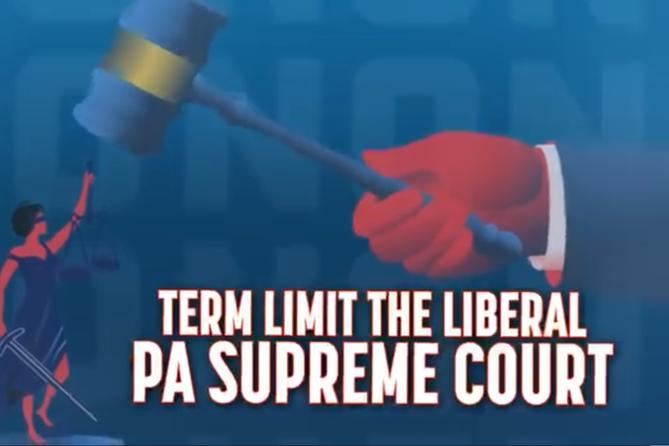HARRISBURG — Spending on Pennsylvania’s critical Supreme Court retention elections is mounting, with three more influential and well-heeled groups beginning to fund ads and mailers.
A national group, the deep-pocketed Democratic Legislative Campaign Committee, says its six-figure support of the three Democratic justices up for retention is an investment in protecting abortion access and elections.
The state and national chapters of the ACLU say they plan to spend $500,000 on a mail campaign to inform voters about the race “and what it means for their civil rights and civil liberties.” The organization’s website does not make an explicit case for yes or no, but the ACLU previously spent money attacking Republican judge Carolyn Carluccio during the court’s contested 2023 election.
The third heavy hitter getting into the race, conservative group Commonwealth Partners, has begun spending more quietly. Part of a network of political organizations heavily funded by Bala Cynwyd stock trading billionaire Jeff Yass, it hasn’t laid out the scope of its plans, but launched a wave of social media ads, mailers, and text messages asking voters to “term limit the woke Democrat Pennsylvania Supreme Court.”
And all this is likely just the beginning of the spending Pennsylvania will see in the lead-up to Nov. 4.
Normally sleepy affairs, retention elections involve voters either approving or denying new 10-year terms for sitting judges. This year is significant because three justices on the commonwealth's highest court, Supreme Court Justices Christine Donohue, Kevin Dougherty, and David Wecht, are on the ballot. All were elected as Democrats in 2015, flipping the court from Republican to Democratic control.
This liberal majority has since ruled on high-profile issues including mail ballots, redistricting, and pandemic-related health measures.
The Pennsylvania Bar Association, a nonpartisan trade group for lawyers that often evaluates judicial candidates’ qualifications, has recommended all three for new terms. But Republicans aim to convince voters to reject the justices. If that happens, competitive, partisan elections will be held in 2027 to fill any vacancies.
Spotlight PA has previously reported on two groups, one Republican and one Democratic, that have begun spending on the race.
Retention elections aren’t technically partisan. All of the judges up for retention will run with no signifier on the ballot that they were elected as Democrats. However, that doesn’t prevent partisan messaging about the race.
Heather Williams, president of the Democratic Legislative Campaign Committee, said in a statement that it “is clear-eyed on the major implications that these Pennsylvania state supreme court races will have on Democratic legislators' ability to deliver on their agenda in Harrisburg, as well as the redistricting process at the end of this decade.”
The court oversees debates between the legislature and governor on Pennsylvania’s congressional map, and the current majority has picked the past two. The high court also typically picks the chair of the committee that draws state House and Senate boundaries.
Mike Lee, executive director of the ACLU of Pennsylvania, said his organization is focused on a range of issues related to civil liberties.
“In recent years, the court has made monumental rulings on abortion rights, voting rights, workers' rights, and access to healthcare,” Lee said in a statement. “We want Pennsylvania voters to know that even during off-year elections, their choices carry immense weight in shaping the outlook of our communities and the strength of our constitutional protections.”
A spokesperson for Commonwealth Partners did not respond to a request for comment.
One of its online ads focuses on the court’s 2018 decision to toss out a GOP-drawn congressional map as an unconstitutional gerrymander, order state lawmakers to redraw it, and then commission its own map when the legislature and governor deadlocked. This decision “rigged the system for the radical left,” the ad says.
(The decision shifted the state’s congressional delegation from 13-5, in favor of Republicans, to 9-9. Republicans argued that the court overstepped in implementing its own plan, but experts said that the old, GOP-drawn map was among the most gerrymandered in the country.)
That same ad also notes a 2022 decision in which the court ruled 5-2 along partisan lines to have a lower court review an appeal from a man found guilty of sexually abusing a 7-year-old girl. Another cites the court’s 2021 decision to overturn the conviction of comedian Bill Cosby on a technicality, saying that the ruling "endangers women and girls.”
“This election, we can term limit the woke Democrat Pennsylvania Supreme Court,” the ad says, concluding: “The court must change.”
Multiple Commonwealth Partners ads also link to a website paid for by “Citizens for Term Limits.” No such organization has yet registered with the Pennsylvania Department of State, which regulates political groups.
How much money is behind the effort still isn’t clear. Commonwealth Partners is incorporated as a nonprofit, making it a so-called dark money group that does not have to reveal its donors as it spends on political ads.
The election is Nov. 4.
Republicans need voters to reject at least Dougherty or Wecht to have a shot at flipping the court in 2027. At least one vacancy is sure to be on the ballot that year, regardless of the outcome this November.
Donohue, one of the justices up for retention this year, will face mandatory retirement in 2027 because of her age.
Two more high court justices, one Democrat and one Republican, will be up for retention in 2027 as well.
